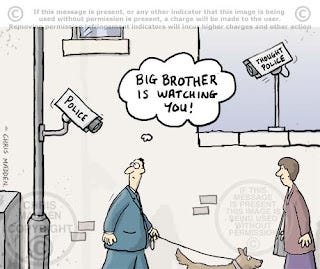Another city wants to monitor its citizens, by installing 200 surveillance cameras.

TX - Motorists driving into Sugar Land may soon turn right into a growing debate between the need for government surveillance and the protection of civil liberties, a sensitive issue cropping up in cities across Texas and the nation.
Sugar Land officials are considering placing about 200 surveillance cameras at all entrances to the city as a crime-fighting tool. The ACLU and other civil libertarians warn that public camera surveillance by law enforcement could be easily abused and encourage governments to strike a balance between legitimate law enforcement use and privacy concerns.
City spokesman Doug Adolph said the license plate recognition cameras have been used in Sugar Land for about five years as a "passive investigation tool" where information is stored and can later be searched for criminal investigations. The city has three plate readers in the Sugar Land Town Center, city parks and in five police cruisers, Adolph said.
"We envision a detective going to the camera and pulling up data for a specific time period and looking for a vehicle that matches the vehicle's description after a crime," Adolph said.
The proposed expansion would come in two phases, the first estimated to cost $1.3 million for 80 cameras at 17 intersections and a second group of 125 cameras at 22 intersections for $1.6 million. The data will only be used to solve crimes and will not be publicly available. It will not target motorists who owe fines or other fees, city officials say.
"The government has unique powers to kick down your door, put hands on you, and take you to jail," said Jim Harper, director of information policy studies at the CATO Institute in Washington, a think tank that promotes limited government. "So when we worry about privacy, I think it's more important to worry about privacy from government than from the private sector."
Harper, a former member of the Department of Homeland Security's advisory committee on data privacy, said the greatest danger presented by public surveillance footage is it can be amassed digitally and then supplied to other agencies to investigate citizens.
"The worst-case scenario is fairly straightforward," Harper said. "They violate their (data destruction) policy, keep a massive database of the local travels of citizens. They feed that into the local fusion center, which feeds that to the federal government. Now the movements of Sugar Land residents are available to all manner of agencies.
Dotty Griffith, public education director at the American Civil Liberties Union of Texas, echoed concerns about the use of surveillance video in public areas. "In general, we always have concerns about these kinds of policies and how they are going to be used," she said. "We would want to know if those policies would be in writing and how they would be enforced. And more importantly, who has access to the data? Is it only investigators?"
The ACLU's fear is that the cameras would provide a way to track the public. "When there's no evidence of a crime, it's just massive overreach into the everyday comings and goings of innocent people," Griffith said. "We are very concerned that any of those technologies have very strong constitutional and privacy safeguards."
http://www.chron.com/news/houston-texas/houston/article/Plan-for-cameras-pits-safety-versus-privacy-in-4003433.php


